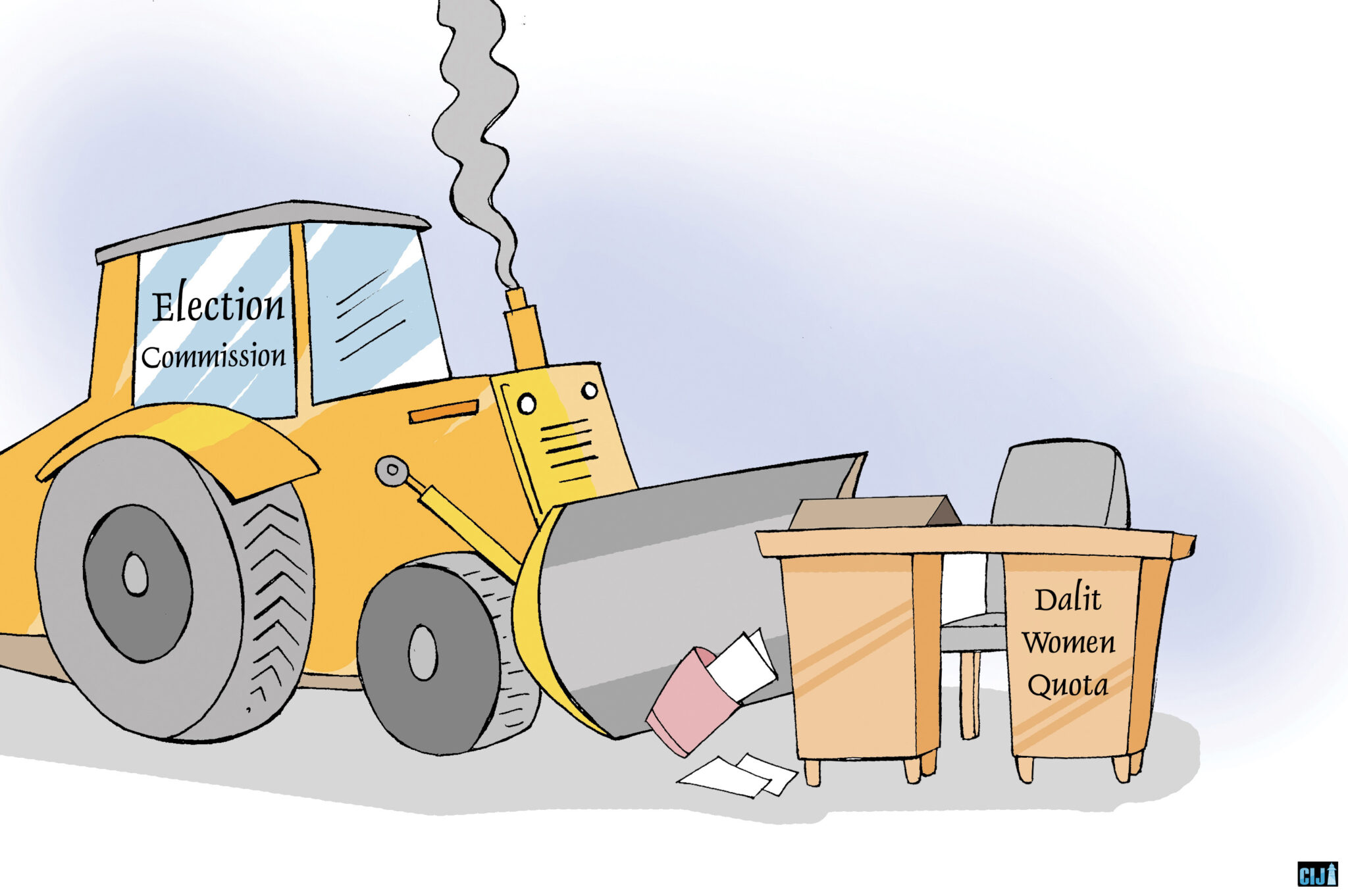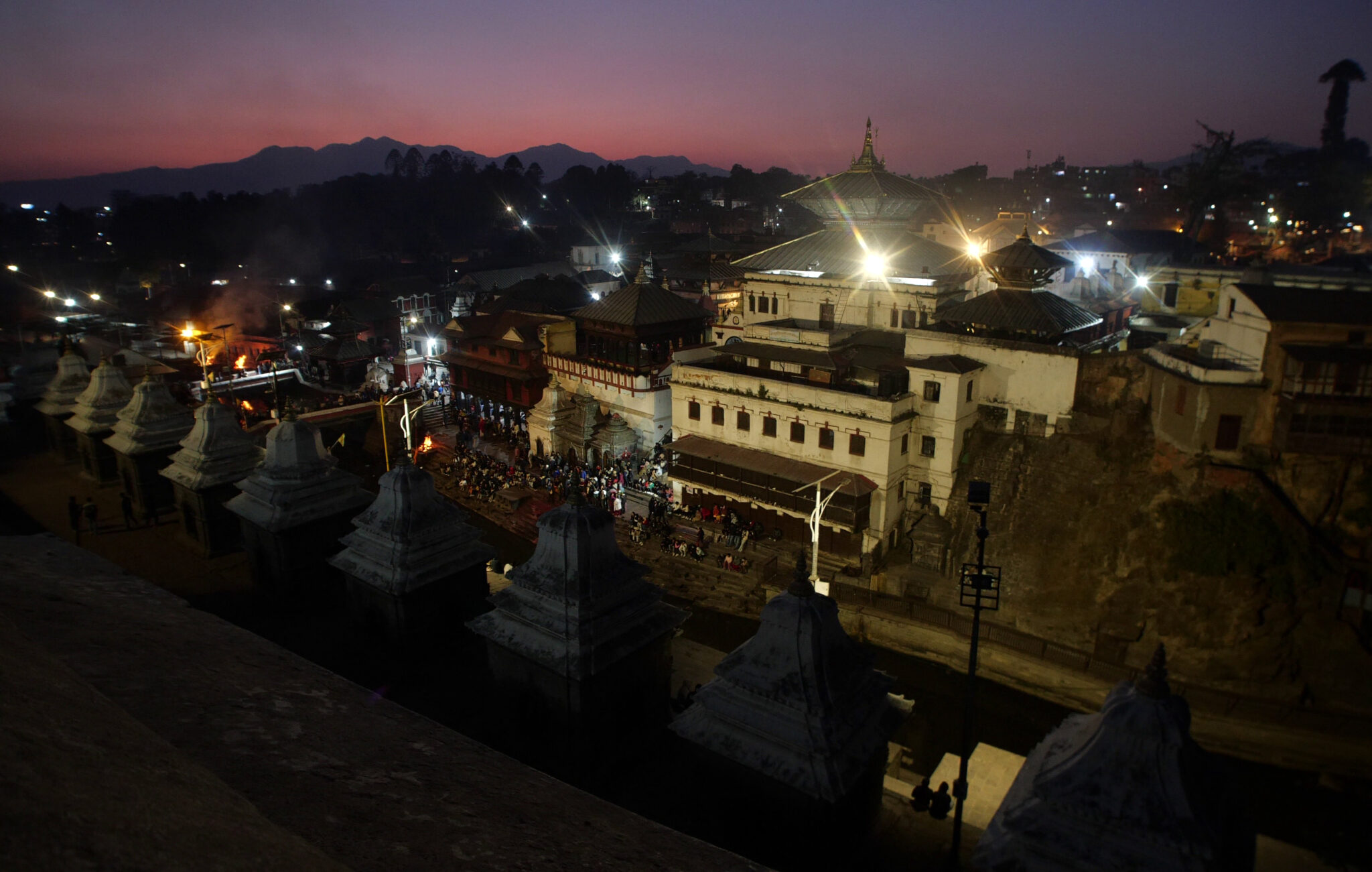In the last three months, five postpartum women aged 28 and below have died in Bharatpur Hospital. According to the hospital’s internal report, “They lost their lives due to lack of coordination between departments”. The report to the Ministry of Health revealed.
-Pramod Acharya and Ekal Silwal: Centre for Investigative Journalism-Nepal
In Ashwin, Kartik and Mangsir 2074, five women aged 21-28 who had gone to Bharatpur Hospital for maternity services and postpartum care have lost their lives. The hospital has not yet issued official statements regarding these deaths. Instead, efforts have been made to hide the truth. The hospital’s superintendent Dr. Rudra Marasini even used abusive language saying, “It is not necessary to inform you all regardless of the causes of deaths. Is it written anywhere that we need to inform you?”
After a few weeks of investigation and contact with high level sources from the Minstry of Health, we came to know that there is serious negligence by doctors and management shortcomings in Bharatpur Hospital. In the meantime we received the hospital’s secret analysis reports indicating that “patients in all the mentioned cases could have been saved.”
Five women who need not have died
Twenty six years old Bina Adhikari from Sarlahi Bagmati, 22 years old Sunu Bhujel from Chitwan Gunjnagar, 21 years old Suruchi Suwal from Prembasti, 28 years old Shova Chapagain and 22 years old Keshiya Mahato from Chitwan Gauriganj who had all gone to Chitwan Bharatpur Hospital for giving birth and medical care passed away on Ashwin 9, Ashwin 26, Kartik 20, Mangsir 4 and Mangsir 12 respectively.
Families of the deceased were told that they could return home as “taking them anywhere cannot save them.” The hospital management informed them that the women lost their lives as a result of the seriousness of their own defective health conditions and not due to the incapacity of hospital.
However, deaths of the women who had gone there for postpartum care and maternity services as well as their babies, within a short period of three months, spread fear within the hospital. So somebody secretly did an internal investigation and the conclusion was serious: “Their deaths were due to the incapacity of the hospital and the patients’ lives could have been saved.”
The individual death review forms of the deceased sent to the Family Health Division in Kathmandu indicate that the deaths were indeed caused by the incompetence of the hospital.
According to proofs obtained by CIJ, the hospital has acknowledged that “the deaths of Keshiya of Gauriganj, Suruchi of Prembasti and Bina of Sarlahi were due to lack of proper coordination and internal communication between the doctors of different departments within the hospital.”
Keshiya had regained consciousness after surgery. But there was no coordination between doctors from different departments regarding necessary treatments and she died when her kidneys suddenly stopped functioning. The hospital concluded that she could have been saved had there been a multi-disciplinary team of specialists (e.g. nephrology unit) there.
Keshiya had been visiting the same hospital for regular checkups during pregnancy and had an appointment to go there for delivery on Mangsir 22. When she arrived earlier, on Mangsir 10, the examining doctor indicated that she had high blood pressure which needed to be brought down with medication and operated on immediately. Her baby was delivered by cesarean section the same day. According to family members she had walked a bit and taken public transport to the hospital on her own.
In the hospital report they have acknowledged that she had a virulent infection in the post-operative ward and ICU after surgery, due to which she suffered a septic shock.
It was stated in the analysis report that another reason for her death was the shortage of necessary manpower to cope with emergencies in the hospital. Keshiya’s operation was performed by obstetrician and gynaecologist and head of department Dr. Sunilmani Pokhrel. Others in the operation team included obstetrician Dr. Hem Nath Subedi and anesthesist Dr. Pradeep Adhikari.
It is also reported that Suruchi could have been saved had there been a qualified medical team in the ICU and proper exchange of information between departments. The hospital has also acknowledged that there was lack of monitoring of the patient while in the post operative ward after surgery.
Suruchi died because she did not receive proper medicalcare before going into a state of shock (brought about by extensive bleeding and severe fall in body temperature) following surgery. Her condition deteriorated when the bleeding continued even while moving her to the post operative ward. According to hospital records, her ‘shock’ was due to unknown causes and the inability to immediately arrange for a second operation after the bleeding continued. Dr Manju Pandey, anesthesist, Dr Pradeep Adhikari and others were also present during her operation while Dr Jeevan Pariyar, Dr Ramhari Dhakal and others were involved in her treatment.
Bina from Sarlahi, Bagmati, would also be living if she had received timely treatment in the hospital. According to the hospital’s analysis report she too died due to lack of efficient flow of information between departments. In an internal report, the hospital acknowledges that she did not receive proper care while in the ICU. However, the patient’s relatives were told that neither the mother nor the baby could be saved as a result of the patient’s heart and liver failure.
Based on the hospital’s secret report Sunu from Chitwan Gunjnagar and Shova from Nawalparasi Devchuli are also among those who lost their lives for having gone to the hospital to have safe delivery and maternity care.
According to the Ministry of Health’s Family Health Division, if a mother dies after giving birth to a baby, a completed maternal mortality analysis form must be sent to the ministry within 72 hours of her death. Such reports have also been submitted by Bharatpur Hospital as required.
The completed analysis forms intended for their usefulness in improving safety standards in maternity and child care programs and policies do not allow doctors to neglect accurate descriptions when submitting them. However, in the analysis forms sent by Bharatpur Hospital to the Family Health Division, it is not clearly stated that the two deaths could have been prevented. The hospital has submitted conflicting reports on the causes of deaths and ways in which they could have been prevented.
A specialist who does not want his name to be disclosed said that the attempt to hide details of the causes and possibilities of prevention of Sunu’s and Shova’s deaths was suspicious. Obstetrician and gynaecologist Dr. Hemnath Subedi, anesthecist Dr. Pradeep Adhikari, Dr. Dilip Kumar Yadav and others were involved in the surgeries.
Sunu died for not having received medical treatment for two days after arriving at the hospital for delivery. This shows another weakness of the hospital doctors for being responsible for her death. She had attended four pre-natal checkups in Bharatpur Hospital. It was already clear from ultrasound reports of Shrawan 22 that due to foetal abnormalities there would be little chance of a normal delivery. However, the doctors had not informed her or her family members accordingly. Sunu died two months later. Only then did they argue with her family that the pregnancy should have been terminated earlier instead of waiting for a full term.
She had an appointment for delivery of the baby on Ashwin 25 but had been suggested to go to the hospital two days earlier. Her family claims that they had done as advised but they were kept waiting in the hospital for two days. According to Sunu’s mother-in-law, Til Kumari, after her death the doctors said it was their own fault. She had been taken to ICU when she suddenly lost consciousness while waiting during labor pain and died without regaining consciousness.
Repeated attempts at covering up mistakes
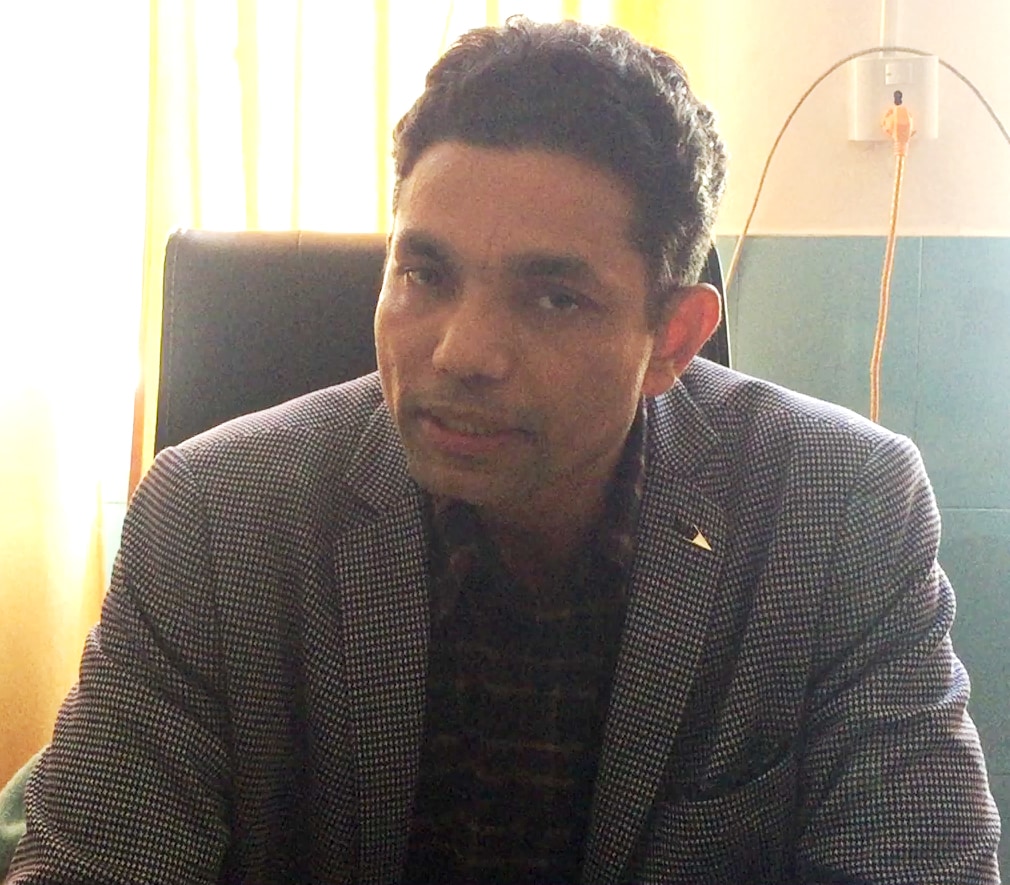 “I won’t say”: Dr. Rudra Marasini, Chief Medical Superintendent
“I won’t say”: Dr. Rudra Marasini, Chief Medical Superintendent
–It’s unnecessary to speak every matters with you, I am not going to say.
-I won’t even say if patients have died of negligence in operation or lack of care from doctors and nurses.
-I won’t say even if you vandalize hospital or incinerate it.
– I won’t utter a word of the internal analysis report of our hospital.
-won’t share how we negotiated with deceased family.
– you have approached me with ill intention and just asking me questions won’t improve the conditions of the hospital.
– file a complaint then only I will provide you with detailed analysis report. I won’t entertain you by just entering my room and asking me.
Although it has been acknowledged that the hospital and the doctors caused loss of lives in the above cases, the hospital administration refrains from making them responsible. Instead of making necessary improvements they continue attempts at covering up their mistakes.
It is clear from the hospital’s public statements that they are trying to hide their own weaknesses. The death review forms, medical records and death certificates prepared by the hospital and the verbal explanations given to patients’ families are contradictory.
We also went to Chitwan for an initial investigation and to interview the hospital’s medical superintendent, Dr. Rudra Marasini. He claimed that the hospital was not at fault regarding the women’s post natal deaths there. He said that their own medical conditions were responsible for the loss of lives, and that they could not have been saved even if they had been taken elsewhere. We had brought along the hospital’s internal reports but he tried his best to lie to us.
Earlier the hospital had verbally informed the families of Keshiya, Sunu, Bina and Shova that they had died as a result of heart and kidney malfunctions, which the doctors had described as diseases without cure. Suruchi’s family had been told that she died because of severe hemorrhage caused by an extreme deficiency of blood clotting factors. They were also told that it would not be possible to find a solution anywhere else either. Dr. Marasini reiterated the same to us.
All three reasons are shown on the death certificated issued to families of the deceased. The hospital has stated the causes of deaths of Keshiya, Suruchi and Sunu as being septic shock, coagulopathy and cardiac and respiratory failure respectively. Likewise, Shova and Bina are said to have died of heart and kidney failure.
In general the hospital management is not willing to acknowledge their mistakes. Families and relatives of the dead who do make enquiries are often told that the women died due to their own medical conditions. To those who were still not convinced, the hospital was found to have given some monetary compensation to keep them quiet.
As mentioned already, the families of all five women who had died had been told that it was all due to their own medical conditions. Four out of the five families simply accepted what the doctors told them. But after relatives of Shova from Nawalparasi protested at the hospital they received some monetary compensation. Arrangements were made for the hospital to pay them NRs200,000. In addition, the hospital was to pay for her daughters’ education and provide them with free health care for life. According to Shova’s mother-in-law, Manrupa Chapagain, the hospital negotiated only when they refused to take back her dead body.
In a similar manner Sunu’s agitated relatives were promised that the hospital management would be responsible for arranging a job with a salary of NRs9-10,000/month for one family member. We learned from her mother-in-law that having lost Sunu, it would be of much use and therefore refused to accept the offer.
Medicines without batch numbers
Based on hospital reports, the women’s deaths are apparently the result of lack of internal coordination between departments responsible for treatments and lack of proper monitoring after surgery. In order to avoid responsibility the hospital and doctors first try not to disclose facts. According to the hospital management the dispensing of medication may also be to blame.
The hospital had sent medicine samples to the Department of Drug Administration (DDA), Babarmahal in Kathmandu, for checking on Mangsir 20 only. The relevant letter from the hospital had been written in a rather cunning manner. It read: “Compared to the past, there has been an unexpected increase in the rate of maternal mortality of pregnant women coming to Bharatpur Hospital for medical treatment. We therefore request your support by sending over a team of specialists for checking the quality and standard of medicines.”
Apparently the correspondence for the quality inspection of medicines came only after 2.5 months of what the hospital itself describes as “the increase in the rate of maternal mortality”. The hospital management had nothing to say about the various attempts it had made in the meantime. Superintendent Dr Marasini said, “It is not necessary to disclos what we have done regarding this matter.”
Based on the request a special inspection team from Kat hmandu was sent to Bharatpur Hospital on Poush 2. The hospital, however, did not inform the team about which medicines were actually used in the treatments. Member of the specialist team and senior quality inspector of the National Drug Research Laboratory (NDRL), Shivani Khadki, said, “In the medical records of the deceased only the names of medicines were shown, without indicating batch numbers.”
The team from the DDA and NDRL returned having made general enquiries and inspection of the drugs on stock. It wasn’t until Poush 26, almost a month later, that DDA received the nine samples of drugs that had been sent to them. They are all drugs that the Nepali government distributes free-of-charge to post-partum women under the “Safe Motherhood Program”. The NDRL is currently doing a quality check of those drugs.
The hospital should have performed autopsies in each case in order to find out the actual causes of death. However, they carried out a postmortum examination on Sunu from Gunjnagar only. Mourning relatives of some of the deceased said following unexpected deaths they were too sorrowful and preoccupied to be bothered about postmortum examinations. Others were told that postmortems would require the dead bodies to be cut into pieces, which terrified them.
Bina’s husband Biraj Adhikari said, “I did not believe what the doctor told us regarding our patient. When we requested a postmortum examination the doctor informed us, “In that case we will remove all the organs to show you.” Adhikari added that he did not pursue the matter further as what has happened has happened. Why bother to remove body parts of the dead? They just took the dead bodies of mother and child to Bagmati and performed separate final rituals for them.”
Those who did not return alive from hospital
Shova Chapagain (age 28), Nawalparasi
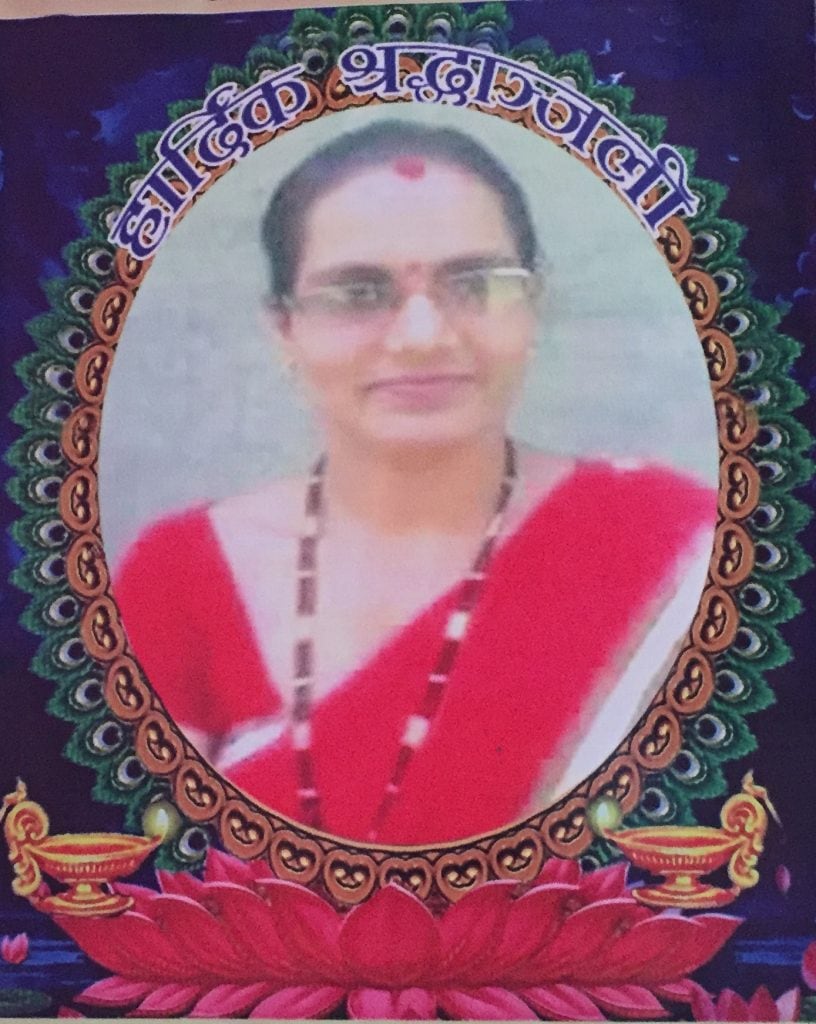 When we visited Shova Chapagain’s home in Devchuli-16, Nawalparasi at 10:00am on Poush 26, her five year old daughter, Sakchi, and mother-in-law, Manrupa, were circling the house with lit incense sticks in hand. Having gone around three times they entered the house from the back door. We followed them in.
When we visited Shova Chapagain’s home in Devchuli-16, Nawalparasi at 10:00am on Poush 26, her five year old daughter, Sakchi, and mother-in-law, Manrupa, were circling the house with lit incense sticks in hand. Having gone around three times they entered the house from the back door. We followed them in.
Sakchi entered one of the rooms in which oil lamps were burning in front of portraits of gods and goddesses. Above was a photo of Shova with a message of condolence written on the wall. Sakchi and Manrupa faced Shova’s photo to perform rituals with their incense sticks, following which they stood there and prayed for a while.
Sakchi is a girl whose mother had gone to the hospital to give birth to a second child and never returned. There were 13 days of mourning rituals after the mother’s passing. After that Sakchi has been maintaining the same routine of praying to her mothor’s photo every morning.
In the evening Sakchi looks all around waiting for her mother to return. When she sees a group of people gather around she asks, “Is mother coming home today?” The relatives respond to this innocent question with tears. Her grandmother Manrupa says, “Poor girl, she has not been able to forget her mother. What can I tell her?”
Shova’s sister-in-law, Apsara, says, “When Sakchi asks, I cannot help crying and tell her that her mother is now a goddess and that she will not return. But she does not believe me.” The girl sleeps in another room where a poster is hung showing only the back side her parents’ picture. Manrupa told us they hung it in reverse so Sakchi does not ask for her mother at night and also to help her forget.”
Twenty-eight-year-old Shova’s due date for delivery was Mangsir 6. She arranged for an ambulance herself and went to the hospital with her mother-in-law three days earlier. The day before, she was still packing juice in a neighbourhood factory.
After an examination in the hospital Shova was sent to do an ultrasound. The doctor said the report was “normal”. But then she was suddenly taken to the operation theatre at 5pm and her baby delivered by cesarean section around 6pm. Having handed over the baby to the relatives the doctors had her transferred to the post operative ward. When her mother Krishna Kumari visited her she was suffering from abdominal pain and temperature fluctuations. In addition she had had retention of urine during the night.
At six o’clock the next morning she asked for and drank a little warm water from her mother. By then she was in great discomfort. She asked for her newborn baby and took her on her lap. After a while she had abnormal abdomenal distension due to which the (post operation) stitches came loose and she lost consciousness. Her condition started to deteriorate. The doctors asked if she had existing medical problems and were told she had none.
According to her mother, Krishna Kumari, she was given oxygen immediately after. A number of doctors surrounded her. They were told that the patient’s kidneys had stopped functioning but that they did not have a nephrologist in the hospital. The relatives were asked to bring a few stong men and take her immediately to the medical college. Around 3pm she was sent to the nearby College of Medical Sciences Teaching Hospital for further treatment. There she was put in a ventilator. At 6pm she died without regaining consciousness.
The next day, suspecting Shova died as a result of the hospital’s shortcoming, her family demonstrated against Bharatpur Hospital. After negotiations, the hospital agreed to set up an educational fund of NRs200,000.- for her two daughters including the newborn. They also decided to pay for their education and offer them free medical care for life. After that the family took back her body for the final rituals.
Based on the decision the hospital provided a cheque for NRs100,000.- on the last week of Poush. However, according to Shova’s brother-in-law Buddhi Chapagain, the hospital’s account was inactive at the town and they were unable to cash it. So they returned the cheque. Later, one of the doctors from the hospital called and promised them that another cheque would be issued for the full amount of NRs200,000.-
In order to repay the money they had borrowed for building a house, Shova’s husband Ram Prasad had gone to Dubai for work in Asoj 2074. He could not afford to return even when his wife died. He had borrowed NRs900,000.- to build a new house. Now only his five-year-old daughter Sakchi and mother Manrupa live in that house. The newborn baby is being looked after by her uncle Buddhi in Bhairawa.
Keshiya Mahato (age 22), Chitwan
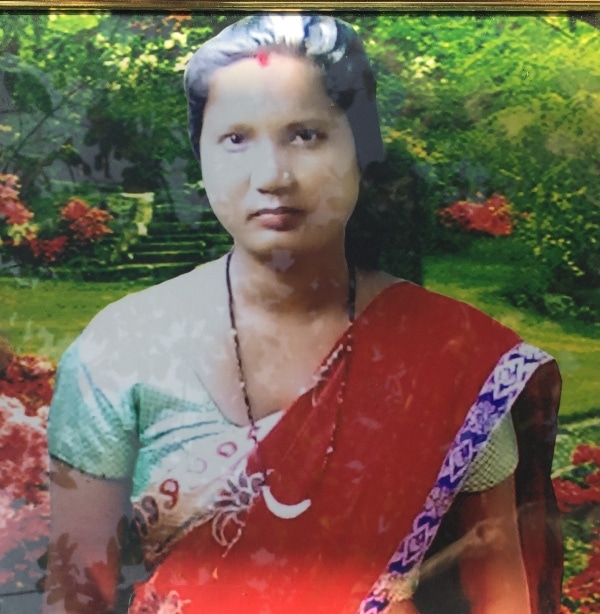 According to the doctors the due delivery date given to Keshiya from Gauriganj, Bharatpur Metropolitan City-9, was Mangsir 22. As advised she used to visit a health post close to her home for checking her blood pressure. Although still a bit early she was excited about becoming a mother and went to the hospital with her sister-in-law Laxmi Gurung, on Mangsir 10.
According to the doctors the due delivery date given to Keshiya from Gauriganj, Bharatpur Metropolitan City-9, was Mangsir 22. As advised she used to visit a health post close to her home for checking her blood pressure. Although still a bit early she was excited about becoming a mother and went to the hospital with her sister-in-law Laxmi Gurung, on Mangsir 10.
After a meal they took public transport from her home to the hospital. As she did not have any discomfort, she had walked about half a kilometer to the bus stop. After the examination at the hospital, the doctor told her that she needed to have an operation. She looked self-confident and was of the opinion that she could wait until her labour pain began and have a normal delivery without an operation.
She had a blood test as suggested by the doctor. When it was decided that she would have an operation the same day, Laxmi phoned up Keshiya’s husband, Krishna Thapa, to come over to the hospital. But she had been taken to the operation room even before the blood test results were out.
Laxmi said that after having waited outside for a long time a doctor came out for signatures on some documents. Her brother was afraid but signed the papers anyway. A baby girl had been born by cesarean section and the nurses came out around 1pm to hand it over to them. Soon after they were told that the patient needed to be transferred to ICU.
From time to time Laxmi would check with Keshiya how she was feeling. She seemed to be okay except for some abdominal pain. All her relatives were expecting her to recover in a couple of days in ICU but the following morning they were alarmed to hear about her urine retention. At that time she had also asked about the baby.
All of a sudden the doctors informed them that Keshiya had lost much blood and ordered a lot of medication. Upon hearing that she was in a serious condition many relatives had gathered outside. At times four or five of them were going about trying to get the required medicines while the patient inside was suffering from respiratory problems and abdominal distension. The doctors said it was due to the pressure in the kidneys.
When it became obvious that she would need blood transfusion the relatives outside began to make necessary arrangements for three or four blood doners. She was given a blood transfusion but her condition did not improve. The relatives wanted to take Keshiya to another hospital but were told it was not advisable to move her while in such a serious condition.
Her eyes were yellow that day. She said she could not see and that she felt drowsy. When she felt thirsty they gave her a little water to drink. According to Laxmi, on Mangsir 12, a group of doctors took them to a room and informed them that they were unable to save the patient, which shocked them all.
Laxmi, who had been present from beginning to end said, “Everybody’s attention was on the elections, there wasn’t anybody to speak up on our behalf. We just cried and returned with the body.”
Bina Adhikari (aged 26), Sarlahi
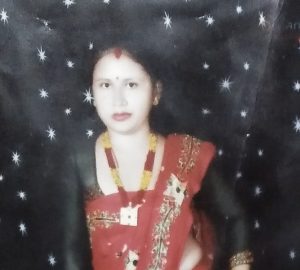 Twenty-six-year-old Bina from Sarlahi, Bagmati Municipality-3, used to teach at the local Safe English Boarding School. Her husband Biraj Adhikari taught at another local private school, Dawning Future Academy.
Twenty-six-year-old Bina from Sarlahi, Bagmati Municipality-3, used to teach at the local Safe English Boarding School. Her husband Biraj Adhikari taught at another local private school, Dawning Future Academy.
During pregnancy, Bina used to visit Sarlahi Hariwan Model Hospital for regular checkups. Her expected date of delivery was Ashwin 6. But on Ashwin 2 and 3, she had fever and been sent home after examination at the hospital. She was also taken to the hospital on Ashwin 4 in order to avoid complications. The following afternoon her fever had not subsided. So the same evening they sent her to Bharatpur Hospital for safe delivery and postpartum care.
Biraj understood from the doctors that she may not need an operation. They suggested she go for a normal delivery of the baby and opt for surgery only if necessary. They were still applying cold sponge on her when at midnight on Ashwin 7 her body temperature began to drop. She was immediately given medication and she started having back and abdominal pain.
There was another woman from her village who was also in the hospital with her. When her labour pain started Bina even discussed with her the possibility of returning home together in the same ambulance. She was given intravenous saline through the night. Around 4am on Ashwin 8, her pain intensified with sudden signs of bleeding. The doctors said she had entered labour and that the cervix was opening.
Sometime later the nurses supported her to walk over to the delivery waiting room. Soon after they asked for and gave her some thyme seed water to drink. Then the doctors started to examin her. At the same time she suddenly clenched her teeth and lost consciousness. But the relatives were not allowed to visit her. The husband, Biraj, later said, “After about two hours of waiting outside the doctors called me in and informed me that they were unable to save both the mother and child. I passed out upon hearing that.”
Not only did the police force them to take back the body, they were also told that if they were not satisfied they could have an autopsy performed on Bina, in which case they would remove the heart, lungs and liver to show them. Biraj is still stunned with what they said. At his home on Poush 27 evening, with a motherless five-year-old son on his lap, he spoke to us of his grievance, “If only the doctors had shown us the medical reports and explained to us what possible consequences there could be, we may even have believed them. But even the causes of deaths are still not clear to us.”
Suruchi Suwal (aged 21), Chitwan
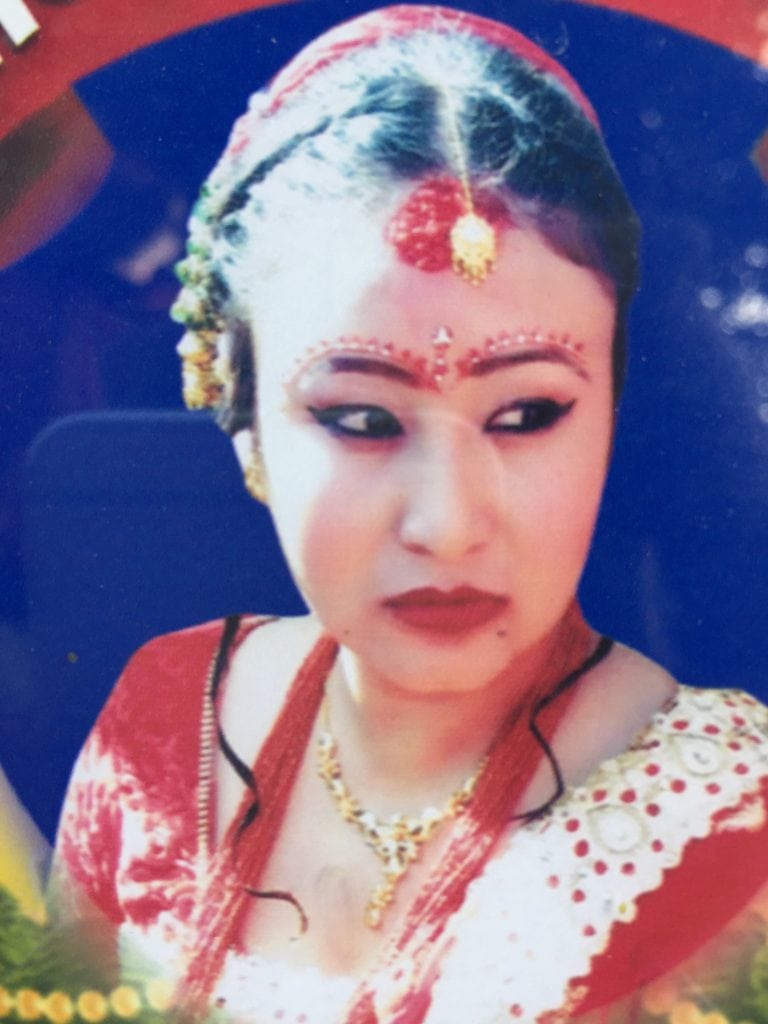 Suruchi Suwal from Prembasti, Bharatpur Metropolitan City-5, did not even have a chance to celebrate her first wedding anniversary. It was less than a year since she got married to Santosh Suwal on Mangsir 29, 2073, and arrived there as a bride from Kalimati in Tanahu. As she did not give birth to a baby on the expected delivery date of Kartik 11, the hospital had given her another appointment to visit a week later.
Suruchi Suwal from Prembasti, Bharatpur Metropolitan City-5, did not even have a chance to celebrate her first wedding anniversary. It was less than a year since she got married to Santosh Suwal on Mangsir 29, 2073, and arrived there as a bride from Kalimati in Tanahu. As she did not give birth to a baby on the expected delivery date of Kartik 11, the hospital had given her another appointment to visit a week later.
Suruchi went to the hospital and got admitted on Kartik 16. She was not given any medication that day. While expecting labour pains to begin, it was not until the following morning when the doctors gave her drugs for dialation of the cervix for two days. It did not work. Instead she continued to camplain of pains.
Suruchi’s apetite was normal. After breakfast on Kartik 19 the doctor said she should have an operation. Around 2:15pm that day the baby was delivered by cesarean section. She even breast fed the baby after coming out of the operation room around 3pm. But she was sweating. She complained of a headache around 3:15pm, asked about the baby and also asked to see her husband. Those were her last words.
According to her elder sister Sushma who was with her, when the patient was unable to speak and seemed to be suffering for an hour in the post operation ward, she requested the nurses on duty to take a look. Only then did they notice that Suruchi was still bleeding and called the doctor. The head of the department of obstetrics and gynaecology, Dr. Sunimani Pokhrel, and seven others after checking the patient decided she would need to be operated on again immediately to stop the haemorrhage. They ordered medication required for a second operation.
However, due to continued haemorrhage it seemed the second operation may not be useful. The doctors told the waiting relatives to look for as much blood supply as possible but that the patient’s chance of survival would be about 5%. According to a neighbor, Deepak Sen, by that evening the shocked relatives had managed to gather more than 20 doners for a supply of fresh blood. But even while the operation was ongoing the doctors informed the relatives that the bleeding did not stop because there was a deficiency of white blood cells in the patient’s blood. It may not be possible to save her no matter where she is taken.
On her way to the hospital Suruchi did not have any problem and had been excited about returning home with a baby. Her sister Sushma said, “The hospital handed us the baby the previous evening. The following morning they handed us Suruchi’s dead body. May this never happen to anybody.”
Suna Bhujel (aged 22), Chitwan
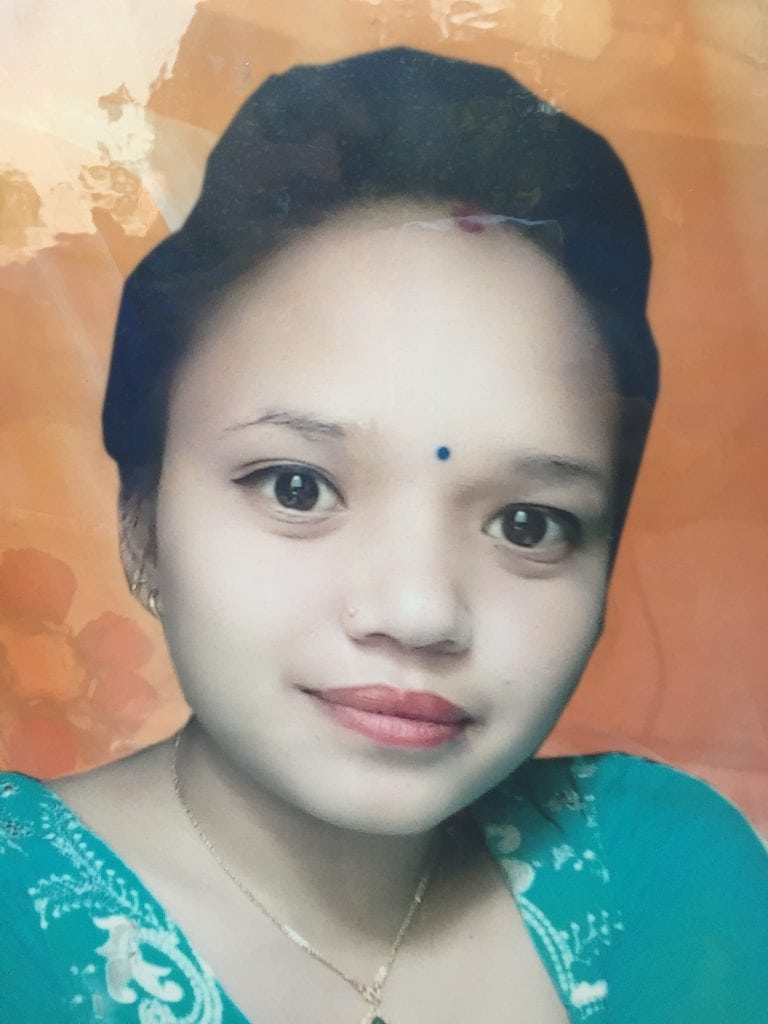 Twenty-four-year-old Suna Bhujel from Gunjnagar, Bharatpur Metropolitan City-19, was laughing and joking with neighbours, before leaving for the hospital on Ashwin 24. She was expecting to return home with her first baby in a day or two.
Twenty-four-year-old Suna Bhujel from Gunjnagar, Bharatpur Metropolitan City-19, was laughing and joking with neighbours, before leaving for the hospital on Ashwin 24. She was expecting to return home with her first baby in a day or two.
Bharatpur Hospital was about 18 kilometers away. She walked from home to the mainroad for public transport to take her there. Along the way she accepted friends’ good wishes and told them, “I shall return with a baby on my lap and laddoo in my hand.” But her wish did not come true. Instead her smiling face returned to the village in the form of a dead body. For the Bhujel family accepting the unpleasant truth was more like a terrible nightmare.
Suna had gone for regular medical checkups at Bharatpur Hospital since she was four months pregnant. Although the doctor had told her expected date of delivery would be Ashwin 25, she went there a day earlier.
As she was unable to get a hospital bed she had to wait on the floor for two days. She was allocated a bed in the prenatal ward around 2pm on Ashwin 25. About an hour and a half later the doctors gave her a tablet of medicine and a half tablet of another medicine. That was all the medicine she had taken. She was still talking to her mother-in-law the following morning.
The relatives waiting outside were taken aback when they saw her being transferred to ICU on a stretcher without telling them. Recognizing Suna only from her clothes the mother-in-law, Til Kumari, followed them to the lift and saw her being taken to the ICU upstairs. She said she lifted the cloth covering Suna’s face and called her name. She only looked back at her. Then the security guard pulled her away and closed the door.
Til Kumari also said, “We already knew we did not have anybody there, but the doctors told us she may be saved if we took her to Kathmandu. It would cost NRs1,200,000. Did we want to try? We told them we will take her anywhere to save her. Then they gave us another excuse about needing to arrange for a helicopter.”
The doctors in ICU had informed a local village official shortly after that Suna had passed away. The hospital took the initiative to perform an autopsy and the doctors made it known that she had died due to insufficient blood flow caused by a narrow valve. On Ashwin 27 final rituals were performed separately for mother and child.
Til Kumari said, “They offered us for a job with a salary of NRs9-10,000/month, but since she had already lost her life we did not even accept.”

